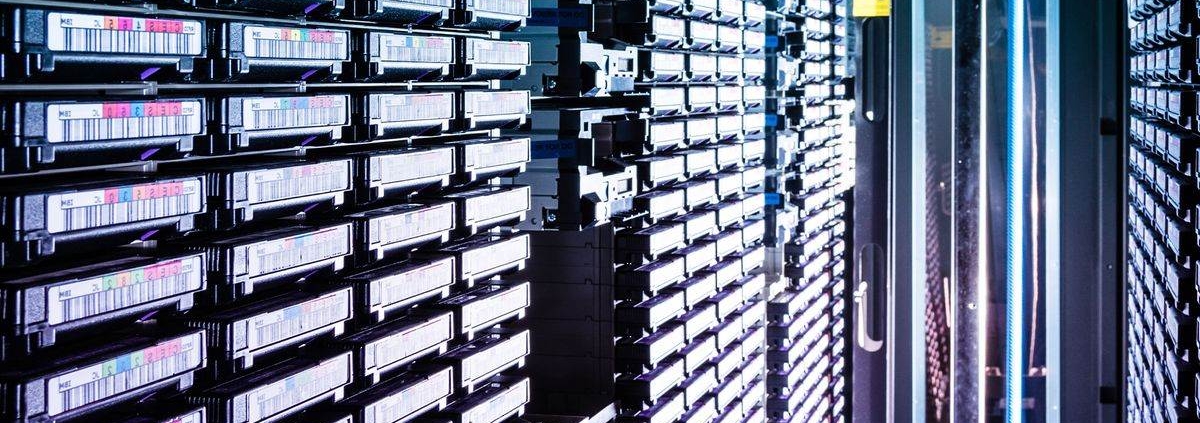Fujifilm Introduces 45TB LTO-9 Tape, A Landmark in Air-Gapped Storage
On Sept. 7, 2021, Fujifilm Recording Media USA officially announced the launch — and crucially, the availability — of the Fujifilm LTO Ultrium 9 data cartridge.
The LTO-9 format is widely expected to supplant LTO-8 as the data tape cartridge of choice for enterprise archival storage. That process may take years; enterprise adoption of new tape formats can be slow due to the perceived (and real) costs of tape migration. Nevertheless, LTO-9 offers significant advantages over its predecessor:
- LTO-9 offers 45 terabytes (TB) of compressed storage capacity and an 18TB native capacity. That’s a 50% increase from LTO-8’s 30TB compressed / 12TB native capacity.
- LTO-9 offers data transfer speeds of 1,000 megabytes per second (MB/s) for compressed data (440 MB/sec native). For comparison, LTO-8 offered 750 MB/s compressed and 360 MB/sec native.
- Like LTO-8, LTO-9 supports the LTFS filesystem, which allows for access to individual files — a potentially crucial consideration when using data tapes to protect against ransomware and other threats.
While LTO-9 is a major step forward for air-gapped storage media, the new format breaks with the tradition of the Linear Tape Open format: Previous generations doubled the capacity of their predecessors and typically doubled data access speeds.
LTO-9 offers a comparatively modest increase in capacity and performance. However, it’s still a substantial improvement; 45-terabyte cartridges can conceivably cut the cost of archival storage significantly for enterprises with large archival infrastructures. The improved read speeds are expected to have a dramatic effect during disaster recovery, electronic discovery, and other instances that require access at scale.
Who Should Consider an Upgrade to LTO-9?
All Linear Tape Open formats are backwards-compatible for at least one generation. In other words, LTO-9 drives can read LTO-8 tapes, although they’re limited by the access speed of the format. That means that LTO-9 hardware can read compressed LTO-8 cartridges at speeds of up to 750 MB/s, but upgrading to the new format won’t increase access speeds past this point.
As data tape experts, we believe that all enterprises should consider migrating to current-generation formats, particularly when IT administrators encounter issues related to archival storage. If your archives have a large physical footprint or your backups routinely span numerous tapes, upgrading to LTO-9 makes sense.
Some factors to keep in mind when making your decision:
- The backwards compatibility of LTO-9 can limit many of the costs associated with tape migration.
- LTO-9 media is expected to have a significantly lower cost per terabyte than LTO-8. The format also reduces energy costs and CO2 emissions, per Fujifilm’s press release.
- While well-maintained LTO-8 hardware will be available for the conceivable future, the introduction of new formats can drive up the cost of legacy tape drives. For many organizations, upgrading at the beginning of the format lifecycle can reduce long-term expenses.
- LTO-9 tape libraries can improve archival scalability and reliability. While LTO-9 boasts a mere 50% capacity improvement over the previous generation, tape library implementation may enable an enterprise to implement more effective structural improvements in its archival strategy.
- Wherever possible, tape migration should not be assigned to your IT team. Migration requires thorough evaluation of each tape and set, along with thorough documentation. In other words, it’s a time consuming task that can create fatigue, even for seasoned IT administrators.
By working with an experienced migration partner, enterprises can reduce the resources allocated for this type of project — Total Data Migration maintains an extensive hardware library that includes all LTO formats (along with DLT, AIT, reel-to-reel, and other legacy tapes). Our team has the necessary experience to manage issues that occur during migration including data conversion, data tape repair, and security compliance considerations.
To discuss LTO-9 conversion or other tape migration services, contact us today to set up a consultation.




